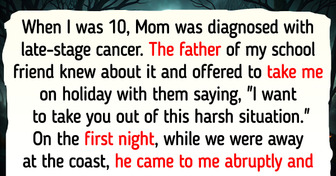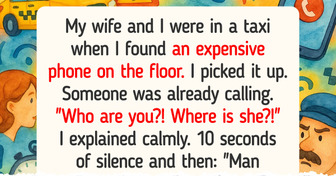15+ Stories That Prove Moms’ Love Tank Never Runs Empty


At first glance, it seems like a simple misunderstanding—but it rarely stays that way. When one partner insists something isn’t true and the other refuses to believe them, things can spiral quickly. Sometimes, though, there can be so much more than meets the eye.

Dear Bright Side,
I have been married to my husband for 3 years. Overall, we’re solid — nothing perfect, but I never had any serious concerns about our relationship. Until now.
About a month ago, he randomly said something like, “I can tell you’re pregnant.” I laughed and told him I definitely wasn’t. We’ve been careful, I track my cycle, and I had just finished my period.
But he was so sure. Like weirdly sure. He said things like, “You’ve been glowing,” “Your mood is different.”
At first, it was cute — kind of flattering, like maybe he just really wanted a baby or something. But then it got... intense. He kept bringing it up daily. Then multiple times a day. I took a test just to reassure him. Negative.
He said, “Sometimes it takes time for the hormones to show.” Okay, fair. I took another one a few days later. Still negative. He still didn’t believe me.
He started treating me like I was pregnant. Buying prenatal vitamins. Cutting caffeine out of my morning coffee. He even told his mom I was expecting. Without me knowing. I was mortified when she called to congratulate us.
I finally sat him down and said, “This is starting to freak me out. I’m not pregnant. Why are you so convinced I am?” He just kept saying, “I can feel it. I know it.”
So I started wondering if this was some weird psychological thing. Like delusional thinking? I tried not to jump to conclusions, but it was so uncharacteristic for him.
Eventually I told him that if he really, truly believed I was pregnant, we should go to the doctor together to “confirm it.” I wasn’t even trying to be passive-aggressive — I just needed someone professional to tell him what I already knew.
So we go. I do both tests. Negative. Again.
Then something weird happens. The doctor pulls me aside afterward and asks if my husband has been under a lot of stress lately. I said yes — he’s had a lot going on at work and hasn’t been sleeping well. She recommends he get checked out too, just to be safe.
Turns out he has a pituitary gland tumor. It’s benign, thank goodness, but it was messing with his hormone levels badly. The doctor said it can cause changes in perception, mood, and even trigger delusional thinking — like believing someone is pregnant when they’re not.
It’s called Couvade syndrome, or “sympathetic pregnancy,” and in rare cases it can happen when something is messing with a guy’s brain chemistry.
He’s getting treatment now and starting therapy. He’s also mortified about everything, especially how he acted toward me. I’m just glad we caught it when we did.
Anyway. I just needed to get this out because the whole thing was surreal and honestly a little scary. If your partner starts acting really out of character, don’t write it off. Trust your gut. Sometimes it’s not just “being weird.” Sometimes it’s medical.
Thank you for reaching out! Situations like this can be extremely stressful and might make you feel lost. So we’ve put together a list of tips that might come in handy.

If someone close to you starts acting strangely or fixates on something that doesn’t make sense, it might not just be stubbornness. Sudden changes in perception, memory, or reasoning could point to a deeper medical issue.

Trust your instincts. If a loved one’s behavior is uncharacteristic or escalating in confusing ways, gently suggesting a check-up can make a world of difference. Sometimes, it’s not about winning an argument—it’s about recognizing when something bigger might be happening.

It’s possible to be supportive while also protecting your own emotional well-being. Set boundaries around repeated or stressful conversations, but remain open to the idea that something might not be right behind the scenes.

Even when there’s a medical explanation, the emotional toll of not being believed is real. It’s okay to seek support, talk to a therapist, or take time to heal—especially after a situation that blurred the line between personal trust and hidden illness.
What begins as a disagreement can quickly unravel into something much deeper. These moments reveal just how easily doubt can chip away at trust—and how a refusal to listen can turn a minor issue into a lasting fracture.











